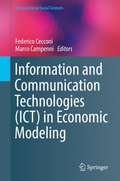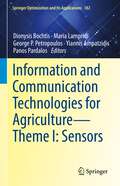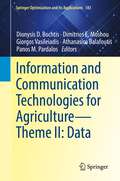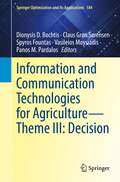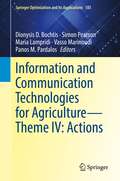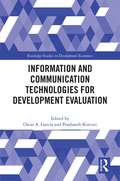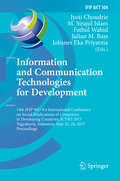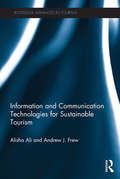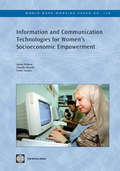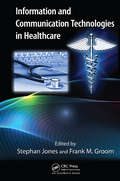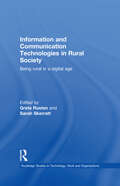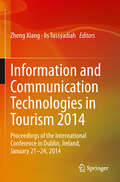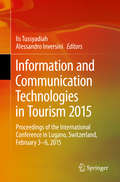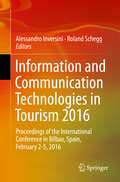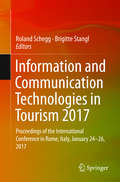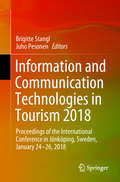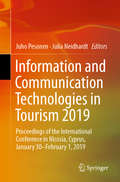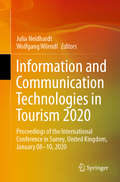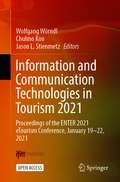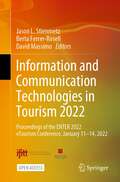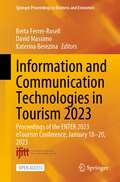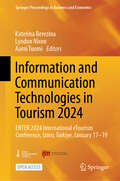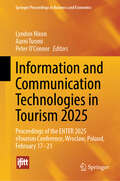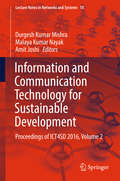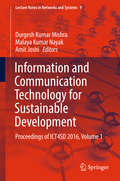- Table View
- List View
Information and Communication Technologies (Computational Social Sciences)
by Federico Cecconi Marco CampennìThis book presents the effects of integrating information and communication technologies (ICT) and economic processes in macroeconomic dynamics, finance, marketing, industrial policies, and in government economic strategy. The text explores modeling and applications in these fields and also describes, in a clear and accessible manner, the theories that guide the integration among information technology (IT), telecommunications, and the economy, while presenting examples of their applications. Current trends such as artificial intelligence, machine learning, and big data technologies used in economics are also included. This volume is suitable for researchers, practitioners, and students working in economic theory and the computational social sciences.
Information and Communication Technologies for Agriculture—Theme I: Sensors (Springer Optimization and Its Applications #182)
by Panos Pardalos Dionysis D. Bochtis George P. Petropoulos Yiannis Ampatzidis Maria LampridiThis volume is the first (I) of four under the main themes of Digitizing Agriculture and Information and Communication Technologies (ICT). The four volumes cover rapidly developing processes including Sensors (I), Data (II), Decision (III), and Actions (IV). Volumes are related to ‘digital transformation” within agricultural production and provision systems, and in the context of Smart Farming Technology and Knowledge-based Agriculture. Content spans broadly from data mining and visualization to big data analytics and decision making, alongside with the sustainability aspects stemming from the digital transformation of farming. The four volumes comprise the outcome of the 12th EFITA Congress, also incorporating chapters that originated from select presentations of the Congress. The focus in this volume is on different aspects of sensors implementation in agricultural production (e.g., types of sensors, parameters monitoring, network types, connectivity, accuracy, reliability, durability, and needs to be covered) and provides variety of information and knowledge in the subject of sensors design, development, and deployment for monitoring agricultural production parameters. The book consists of four (4) Sections. The first section presents an overview on the state-off-the art in sensing technologies applied in agricultural production while the rest of the sections are dedicated to remote sensing, proximal sensing, and wireless sensor networks applications.Topics include: Emerging sensing technologies Soil reflectance spectroscopy LoRa technologies applications in agricultureWireless sensor networks deployment and applications Combined remote and proximal sensing solutions Crop phenology monitoring Sensors for geophysical properties Combined sensing technologies with geoinformation systems
Information and Communication Technologies for Agriculture—Theme II: Data (Springer Optimization and Its Applications #183)
by Panos M. Pardalos Dionysis D. Bochtis Dimitrios E. Moshou Giorgos Vasileiadis Athanasios BalafoutisThis volume is the second (II) of four under the main themes of Digitizing Agriculture and Information and Communication Technologies (ICT). The four volumes cover rapidly developing processes including Sensors (I), Data (II), Decision (III), and Actions (IV). Volumes are related to ‘digital transformation” within agricultural production and provision systems, and in the context of Smart Farming Technology and Knowledge-based Agriculture. Content spans broadly from data mining and visualization to big data analytics and decision making, alongside with the sustainability aspects stemming from the digital transformation of farming. The four volumes comprise the outcome of the 12th EFITA Congress, also incorporating chapters that originated from select presentations of the Congress. The first part of this book (II) focuses on data technologies in relation to agriculture and presents three key points in data management, namely, data collection, data fusion, and their uses in machine learning and artificial intelligent technologies. Part 2 is devoted to the integration of these technologies in agricultural production processes by presenting specific applications in the domain. Part 3 examines the added value of data management within agricultural products value chain.The book provides an exceptional reference for those researching and working in or adjacent to agricultural production, including engineers in machine learning and AI, operations management, decision analysis, information analysis, to name just a few. Specific advances covered in the volume: Big data management from heterogenous sources Data mining within large data setsData fusion and visualizationIoT based management systemsData Knowledge Management for converting data into valuable informationMetadata and data standards for expanding knowledge through different data platformsAI - based image processing for agricultural systemsData - based agricultural businessMachine learning application in agricultural products value chain
Information and Communication Technologies for Agriculture—Theme III: Decision (Springer Optimization and Its Applications #184)
by Panos M. Pardalos Dionysis D. Bochtis Claus Grøn Sørensen Spyros Fountas Vasileios MoysiadisThis volume is the third (III) of four under the main themes of Digitizing Agriculture and Information and Communication Technologies (ICT). The four volumes cover rapidly developing processes including Sensors (I), Data (II), Decision (III), and Actions (IV). Volumes are related to ‘digital transformation” within agricultural production and provision systems, and in the context of Smart Farming Technology and Knowledge-based Agriculture. Content spans broadly from data mining and visualization to big data analytics and decision making, alongside with the sustainability aspects stemming from the digital transformation of farming. The four volumes comprise the outcome of the 12th EFITA Congress, also incorporating chapters that originated from select presentations of the Congress. The focus of this book (III) is on the transformation of collected information into valuable decisions and aims to shed light on how best to use digital technologies to reduce cost, inputs, and time, toward becoming more efficient and transparent. Fourteen chapters are grouped into 3 Sections. The first section of is dedicated to decisions in the value chain of agricultural products. The next section, titled Primary Production, elaborates on decision making for the improvement of processes taking place with the farm under the implementation of ICT. The last section is devoted to the development of innovative decision applications that also consider the protection of the environment, recognizing its importance in the preservation and considerate use of resources, as well as the mitigation of adverse impacts that are related to agricultural production.Planning and modeling the assessment of agricultural practices can provide farmers with valuable information prior to the execution of any task. This book provides a valuable reference for them as well as for those directly involved with decision making in planning and assessment of agricultural production.Specific advances covered in the volume: Modelling and Simulation of ICT-based agricultural systemsFarm Management Information Systems (FMIS) Planning for unmanned aerial systems Agri-robotics awareness and planning Smart livestock farming Sustainable strategic planning in agri-production Food business information systems
Information and Communication Technologies for Agriculture—Theme IV: Actions (Springer Optimization and Its Applications #185)
by Panos M. Pardalos Simon Pearson Dionysis D. Bochtis Maria Lampridi Vasso MarinoudiThis volume is the last (IV) of four under the main themes of Digitizing Agriculture and Information and Communication Technologies (ICT). The four volumes cover rapidly developing processes including Sensors (I), Data (II), Decision (III), and Actions (IV). Volumes are related to ‘digital transformation” within agricultural production and provision systems, and in the context of Smart Farming Technology and Knowledge-based Agriculture. Content spans broadly from data mining and visualization to big data analytics and decision making, alongside with the sustainability aspects stemming from the digital transformation of farming. The four volumes comprise the outcome of the 12th EFITA Congress, also incorporating chapters that originated from select presentations of the Congress. The focus in this volume is on the directions of Agriculture 4.0 which incorporates the transition to a new era of action in the Agricultural sector, represented by the evolution of digital technologies in 4 aspects: Big Data, Open Data, Internet of Things (IoT), and Cloud Computing. Under the heading of “Action,” 14 Chapters investigate the implementation of cutting-edge technologies on real world applications. It will become apparent to the reader that the penetration of ICT in agriculture can result in several benefits related to the sustainability of the sector and to yield the maximum benefits, successful management is required. The entire discussion highlights the importance of proper education in the adoption of innovative technologies starting with the adaption of educational systems to the new era and moving to the familiarization of farmers to the new technologies.This book covers topics that relate to the digital transformation of farming. It provides examples and case studies of this transformation from around the world, examines the process of diffusion of digital technologies, and assesses the current and future sustainability aspects of digital agriculture. More specifically, it deals with issues such as: Challenges and opportunities from the transition to Agriculture 4.0Safety and health in agricultural work automationThe role of digital farming on regional-spatial planningThe enrollment of Social Media in IoT-based agricultureThe role of education in digital agricultureReal-life implementation cases of smart agriculture around the world
Information and Communication Technologies for Development Evaluation: World Bank Series on Evaluation and Development, Volume 10 (Routledge Studies in Development Economics)
by Oscar A. García Prashanth KotturiWritten by a team of expert practitioners at the Independent Office of Evaluation of International Fund for Agricultural Development (IFAD), this book gives an insight into the implications of new and emerging technologies in development evaluation. Growing technologies such as big data analytics, machine learning and remote sensing present new opportunities for development practitioners and development evaluators, particularly when measuring indicators of the Sustainable Development Goals. The volume provides an overview of information and communication technologies (ICTs) in the context of evaluation, looking at the theory and practice, and discussing how the landscape may unfold. It also considers concerns about privacy, ethics and inclusion, which are crucial issues for development practitioners and evaluators working in the interests of vulnerable populations across the globe. Among the contributions are case studies of seven organizations using various technologies for data collection, analysis, dissemination and learning. This valuable insight into practice will be of interest to researchers, practitioners and policymakers in development economics, development policy and ICT.
Information and Communication Technologies for Development: 14th IFIP WG 9.4 International Conference on Social Implications of Computers in Developing Countries, ICT4D 2017, Yogyakarta, Indonesia, May 22-24, 2017, Proceedings (IFIP Advances in Information and Communication Technology #504)
by Jyoti Choudrie M. Sirajul Islam Fathul Wahid Julian M. Bass Johanes Eka PriyatmaThis book constitutes the refereed proceedings of the 14th IFIP WG 9.4 International Conference on Social Implications of Computers in Developing Countries, ICT4D 2017, held in Yogyakarta, Indonesia, in May 2017.The 60 revised full papers and 8 short papers presented together with 3 keynotes were carefully reviewed and selected from 118 submissions. The papers are organized in the following topical sections: large scale and complex information systems for development; women empowerment and gender justice; social mechanisms of ICT-enabled development; the data revolution and sustainable development goals; critical perspectives on ICT and open innovation for development; the contribution of practice theories to ICT for development; agile development; indigenous local community grounded ICT developments; global sourcing and development; sustainability in ICT4D; and information systems development and implementation in Southeast Asia. Also included are a graduate student track, current issues and notes. The chapter ‘An Analysis of Accountability Concepts for Open Development’ is open access under a CC BY 4.0 license via link.springer.com.
Information and Communication Technologies for Sustainable Tourism (Advances in Tourism)
by Alisha Ali Andrew J. FrewSustainable development is a highly topical issue and is of critical importance to tourism as the environment is of utmost importance for the continued development and prosperity of the industry. There have been numerous texts written on sustainable tourism and the measures to mitigate and manage this but none which acknowledges Information and Communication Technologies (ICT) as a mechanism of doing so despite being an emerging area of research. ICT in this context refers to innovative tools which form an integrated system of software and networked equipment that facilitates data processing information sharing communication and the ability to search and select from an existing range of products and services for an organisation’s benefits. Despite the symbiotic relationship, which exists between ICT and sustainable tourism, there has been little research, which has considered how the use of such technology can be used to make sustainable tourism development a more workable reality. This opportune book is the first to provide a focus on the interrelationship of these two important topics demonstrating their synergies and providing insight into a new and innovative approach to managing sustainable tourism development. It considers the use of technology to reduce the negative impacts of tourism from both the demand and supply side perspectives. A critical review of a range of cutting edge technologies used by tourists and businesses to assess their usefulness in managing sustainable tourism development from the macro to the micro level is also discussed. It further integrates examples and practical applications to show how ICT can be an invaluable mechanism in the management of sustainable tourism development. This cutting-edge volume provides a wealth of information on an important yet neglected subject. This book will be invaluable reading for students, researchers, academics and members of the tourism industry looking for new and innovate ways of fostering a more sustainable tourism industry.
Information and Communication Technologies for Women's Socioeconomic Empowerment
by Samia Melhem Claudia Morrell Nidhi TandonThis paper reviews how women in the developing world access and use information and communication technology (ICT). It examines the discourse and controversies surrounding the digital gender divide, including links to poverty and illiteracy. Major themes concerning women and ICTs are explored, such as women in the ICT workforce, how girls and women relate differently to ICT, and opportunities and barriers for women in science and technology in general. Current research relating to gender and ICT is often country-specific and is more prevalent in developed countries than in developing countries. This paper suggests where additional research is needed on barriers to women's entry and access to ICT. The overall objective of this paper is to influence policy dialogue around women and ICT for development by raising awareness of the digital gender divide. Economic opportunity for women in ICT will not be realized until policies address gender considerations and ensure that ICT investment contributes to more sustainable and equitable development.
Information and Communication Technologies in Healthcare (Technology For Non-engineers Ser.)
by Stephan Jones Frank M. GroomAs the population ages and healthcare costs continue to soar, the focus of the nation and the healthcare industry turns to reducing costs and making the delivery process more efficient. Demonstrating how improvements in information systems can lead to improved patient care, Information and Communication Technologies in Healthcare explains how to cr
Information and Communication Technologies in Rural Society
by Grete Rusten Sarah SkerrattDrawing together the experiences of individuals, households and businesses, this book offers an international perspective on the on how and the extent to which the experiential nature of being rural, whether as an business manager in an SME (or micro-enterprise), a non-business person, a retired inhabitant or a housewife is changing as Information
Information and Communication Technologies in Tourism 2014
by Zheng Xiang Iis TussyadiahThe papers presented in this volume advance the state-of-the-art research on social media and Web 2. 0, electronic tourism marketing, website development and evaluation, search engine marketing and optimization, IT adoption and diffusion, virtual travel communities, mobile technologies, management information systems in tourism, eLearning, recommender systems for tourism businesses and destinations and electronic distribution for hospitality and travel products. This book covers the most significant topics contributed by prominent scholars from around the world and is suitable for both academics and practitioners who are interested in the latest developments in e-Tourism.
Information and Communication Technologies in Tourism 2015
by Iis Tussyadiah Alessandro InversiniThe papers presented in this volume advance the state-of-the-art research on big data and analytics, social media, electronic marketing, mobile computing and recommender systems, mobile sensors and geosocial services, augmented reality, wearable computing, smart tourism, electronic distribution for tourism and hospitality products and services, e-learning, responsive web design and management, and eTourism for development. This book covers the most significant areas contributed by prominent scholars from around the world and is suitable for both academics and practitioners who are interested in the latest developments in e-Tourism.
Information and Communication Technologies in Tourism 2016
by Alessandro Inversini Roland ScheggThe papers presented in this volume advance thestate-of-the-art research on digital marketing and social media, mobile computingand responsive web design, semantic technologies and recommender systems,augmented and virtual reality, electronic distribution and online travelreviews, MOOC and eLearning, eGovernment and sharing economy. This book coversthe most significant areas contributed by prominent scholars from around theworld and is suitable for both academics and practitioners who are interestedin the latest developments in eTourism.
Information and Communication Technologies in Tourism 2017
by Roland Schegg Brigitte StanglThis book presents state-of-the-art research into the application of information and communication technologies to travel and tourism. The range of topics covered is broad, encompassing digital marketing and social media, mobile computing and web design, semantic technologies and recommender systems, augmented and virtual reality, electronic distribution and online travel reviews, MOOC and eLearning, eGovernment, and the sharing economy. There is a particular focus on the development of digital strategies, the impact of big data, and the digital economy. In addition to the description of research advances and innovative ideas, readers will find a number of informative industrial case studies. The contents of the book are based on the 2017 ENTER eTourism conference, held in Rome. The volume will be of interest to all academics and practitioners who wish to keep abreast of the latest developments in eTourism.
Information and Communication Technologies in Tourism 2018: Proceedings Of The International Conference In Jönköping, Sweden, January 24-26 2018
by Brigitte Stangl Juho PesonenThis book presents the latest research into the application of information and communication technologies within the travel and tourism sectors. Readers will find insightful contributions on a wide range of topics, including digital marketing, social media and online travel reviews, mobile computing, augmented and virtual reality, gamification, recommender systems, electronic distribution, online education and learning, and the sharing economy. Particular attention is devoted to the actual and potential impact of big data, and the development and implementation of digital strategies, including digital marketing and the digital economy. In addition to the description of research advances and innovative concepts, a number of informative case studies are presented. The contents of the book are based on the 2018 ENTER eTourism conference, held in J#65533;nk#65533;ping, Sweden. The volume will appeal to all academics and practitioners with an interest in the most recent developments in eTourism.
Information and Communication Technologies in Tourism 2019: Proceedings Of The International Conference In Nicosia, Cyprus, January 30 - February 1 2019
by Juho Pesonen Julia NeidhardtThis book provides an extensive, up-to-date overview of the ways in which information and communication technologies (ICTs) can be used to develop tourism and hospitality. The coverage encompasses a wide variety of topics within the field, including virtual reality, sharing economy and peer-to-peer accommodation, social media use, hotel technology, big data, robotics, and recommendation systems, to name but a few. The content is based on the 2019 ENTER eTourism conference, organized in Nicosia, Cyprus by the International Federation for Information Technologies and Travel & Tourism (IFITT) – the leading independent global community for the discussion, exchange, and development of knowledge on the use and impact of new ICTs in the travel and tourism industry. The book offers a global perspective and rich source of information on important innovations and novel ideas. Though it will prove especially valuable for academics working in the eTourism field, it will also be of considerable interest to practitioners and students.
Information and Communication Technologies in Tourism 2020: Proceedings of the International Conference in Surrey, United Kingdom, January 08–10, 2020
by Julia Neidhardt Wolfgang WörndlGathering the outcomes of the 27th annual international eTourism conference ENTER2020, this book presents new research, innovative systems and industry case studies on the application of Information and Communication Technologies (ICT) in travel and tourism. It shares the latest findings discussed at the conference and highlights various topics within the field, including social media, destination marketing, recommender systems and decision-making, virtual and augmented reality, technology in tourism, and research on hotels and activities. Readers will find a wealth of state-of-the-art insights and ideas on how information and communication technologies can be applied in travel and tourism.
Information and Communication Technologies in Tourism 2021: Proceedings of the ENTER 2021 eTourism Conference, January 19–22, 2021
by Wolfgang Wörndl Chulmo Koo Jason L. StienmetzThis open access book is the proceedings of the International Federation for IT and Travel & Tourism (IFITT)’s 28th Annual International eTourism Conference, which assembles the latest research presented at the ENTER21@yourplace virtual conference January 19–22, 2021. This book advances the current knowledge base of information and communication technologies and tourism in the areas of social media and sharing economy, technology including AI-driven technologies, research related to destination management and innovations, COVID-19 repercussions, and others. Readers will find a wealth of state-of-the-art insights, ideas, and case studies on how information and communication technologies can be applied in travel and tourism as we encounter new opportunities and challenges in an unpredictable world.
Information and Communication Technologies in Tourism 2022: Proceedings of the ENTER 2022 eTourism Conference, January 11-14, 2022
by Jason L. Stienmetz Berta Ferrer-Rosell David MassimoThis open access book presents the proceedings of the International Federation for IT and Travel & Tourism (IFITT)’s 29th Annual International eTourism Conference, which assembles the latest research presented at the ENTER2022 conference, which will be held on January 11–14, 2022.The book provides an extensive overview of how information and communication technologies can be used to develop tourism and hospitality. It covers the latest research on various topics within the field, including augmented and virtual reality, website development, social media use, e-learning, big data, analytics, and recommendation systems. The readers will gain insights and ideas on how information and communication technologies can be used in tourism and hospitality. Academics working in the eTourism field, as well as students and practitioners, will find up-to-date information on the status of research.
Information and Communication Technologies in Tourism 2023: Proceedings of the ENTER 2023 eTourism Conference, January 18-20, 2023 (Springer Proceedings in Business and Economics)
by Berta Ferrer-Rosell David Massimo Katerina BerezinaThis open access book provides an extensive overview of the usage of information and communication technologies in the tourism and hospitality industry. It presents the proceedings of the International Federation for IT and Travel & Tourism (IFITT)’s 30th Annual International eTourism Conference, which assembles the latest research presented at the ENTER2023 conference. The enclosed papers cover various topics within the field, including augmented and virtual reality, website development, social media use, e-learning, big data, analytics and recommendation systems.
Information and Communication Technologies in Tourism 2024: ENTER 2024 International eTourism Conference, Izmir, Türkiye, January 17-19 (Springer Proceedings in Business and Economics)
by Lyndon Nixon Katerina Berezina Aarni TuomiFor more than 30 years, Information and Communication Technology (ICT) has been revolutionizing travel, tourism, and hospitality, and as we look to the next 30 years, the change of pace does not seem to be diminishing. This open-access book provides an extensive overview of the latest developments of ICTs in the tourism and hospitality industry. Featuring papers presented at the International Federation for IT and Travel & Tourism’s (IFITT) 31st annual ENTER International eTourism Conference (ENTER24) held in Izmir, Türkiye, this book presents research on topics such as artificial general intelligence (AGI) in tourism and hospitality; emerging technologies in tourism education; virtual reality; technologies for sustainability, health and wellbeing; big data and analytics, among others. This is an open access book.
Information and Communication Technologies in Tourism 2025: Proceedings of the ENTER 2025 eTourism Conference, Wroclaw, Poland, February 17–21 (Springer Proceedings in Business and Economics)
by Peter O'Connor Lyndon Nixon Aarni TuomiThis book provides an extensive overview of the latest developments in information and communication technologies (ICTs) in the tourism and hospitality industry. Featuring papers presented at the International Federation for IT and Travel & Tourism’s (IFITT) 32nd annual ENTER International eTourism Conference (ENTER25) held in Wroclaw, Poland, this book examines the future of the tourism and hospitality industry and the impact ICTs such as generative AI, robotics, and Internet of things (IoT) has in creating a sustainable future for the industry. Information and communication technologies (ICTs) continue to revolutionize travel, tourism, and hospitality. Over 30+ years, the ENTER eTourism conference has been at the forefront of providing insight on the use and impact of new technologies for travel, tourism and hospitality practitioners and researchers. However, the rapid development and deployment of new developments, including generative AI (GenAI), service robotics, IoT, and Extended Realities (XR) technologies, among others, call for a rapid and careful reassessment of ICT in tourism, particularly including ethical and societal considerations. Examining the answer to questions such as how can technology help businesses and organizations be more agile, innovative, and resilient in difficult times; what role does technology play in driving sustainable development; how emerging technologies impact customer and employee experiences, and how challenges and dangers presented by technological disruption can be addressed, this book is valuable to scholars, researchers, students, and practitioners in tourism and hospitality.
Information and Communication Technology for Sustainable Development
by Amit Joshi Durgesh Kumar Mishra Malaya Kumar NayakThe book proposes new technologies and discusses future solutions for design infrastructure for ICT. The book contains high quality submissions presented at Second International Conference on Information and Communication Technology for Sustainable Development (ICT4SD - 2016) held at Goa, India during 1 - 2 July, 2016. The conference stimulates the cutting-edge research discussions among many academic pioneering researchers, scientists, industrial engineers, and students from all around the world. The topics covered in this book also focus on innovative issues at international level by bringing together the experts from different countries.
Information and Communication Technology for Sustainable Development
by Amit Joshi Durgesh Kumar Mishra Malaya Kumar NayakThe book proposes new technologies and discusses future solutions for design infrastructure for ICT. The book contains high quality submissions presented at Second International Conference on Information and Communication Technology for Sustainable Development (ICT4SD - 2016) held at Goa, India during 1 - 2 July, 2016. The conference stimulates the cutting-edge research discussions among many academic pioneering researchers, scientists, industrial engineers, and students from all around the world. The topics covered in this book also focus on innovative issues at international level by bringing together the experts from different countries.
